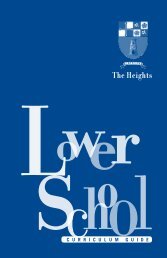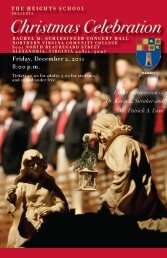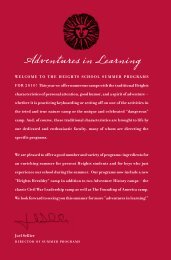The Heights School
The Heights School
The Heights School
Create successful ePaper yourself
Turn your PDF publications into a flip-book with our unique Google optimized e-Paper software.
Parents as Primary Educators<br />
<strong>The</strong> reality that parents are in fact the primary educators of their children informs<br />
the entire educational philosophy at <strong>The</strong> <strong>Heights</strong> <strong>School</strong>. Not only are parents the first<br />
teachers of their children but, through establishing a home with its specific culture,<br />
they continue to form a grounding from which a growing boy learns to assimilate and<br />
value the education and formation available at school. It is absurd to think that any<br />
school, even the best possible school, can take on the task of passing on the riches<br />
of a liberal arts education in only the time a student is at school, about seven hours<br />
per day for roughly half the calendar days of a year. A liberal arts education must be<br />
supported by good habits of reading, conversation, and study; and these are fostered<br />
in the home. To any impartial observer of our culture it is easy to see that one of its<br />
defining characteristics is entertainment. We live in an entertainment culture. <strong>The</strong> most<br />
common forms of entertainment, especially for our children, are video games, television,<br />
movies, certain types of music, and aspects of the Internet. All of these mediums<br />
have contributed to a faster, less contemplative pace. <strong>The</strong> fast-paced nature of these<br />
entertainment media makes focused study and contemplation difficult.<br />
<strong>The</strong> <strong>Heights</strong> <strong>School</strong> relies on parents who are fully-activated primary educators to<br />
establish a home environment that is in unison with the formative and educative<br />
mission of the <strong>School</strong>. <strong>The</strong> faculty members of <strong>The</strong> <strong>Heights</strong> are under no illusion that it<br />
is possible to accomplish our noble goal without the active support of parents in this<br />
area. When parents establish a home where each child is truly valued as a person and<br />
the personal relationships between the members of the family have precedence over<br />
material things and entertainment, they are establishing the necessary conditions<br />
that make acquiring a liberal arts education possible. Parents who are fully activated<br />
primary educators will foster a variety of worthwhile cultural endeavors, such as<br />
reading and discussing good literature, taking family excursions, and living family<br />
traditions in the home. <strong>The</strong>se good endeavors will only grow through the example and<br />
encouragement of parents and the prudent limiting of modern forms of entertainment<br />
that otherwise would tend to take the place of reading and other cultural pursuits.<br />
For this reason, <strong>The</strong> <strong>Heights</strong> <strong>School</strong> seeks to enter into a partnership with families to<br />
work together to accomplish this mission. In the <strong>School</strong>’s admission process, through<br />
the family interview and in other ways, the <strong>School</strong> actively seeks boys whose parents<br />
share this vision and strive to put it into practice.<br />
II.<br />
<strong>The</strong> Upper <strong>School</strong><br />
Academic Program<br />
A Solid Liberal Arts Curriculum<br />
Tailored to Each Student’s Abilities and Interests<br />
Keeping in mind the medieval saying, “Everything is received according to the<br />
mode of the receiver,” the academic programs for <strong>Heights</strong> students often differ<br />
significantly based on each student’s abilities and interests. While the core<br />
curriculum is strong and includes several required courses, there is considerable<br />
flexibility among certain core requirements and among elective choices. <strong>The</strong> overall<br />
academic program is ideal for students of above average to truly exceptional ability.<br />
Each student meets personally with the Head of the Upper <strong>School</strong> every year,<br />
often more than once, to work out an academic schedule for the upcoming year.<br />
Students are encouraged to discuss options with their parents and sometimes<br />
parents also join students in meeting to discuss scheduling options. All academic<br />
programs are given final approval by the Head of the Upper <strong>School</strong> and sometimes<br />
approved changes are made after the school year begins. A good schedule is one<br />
that follows the core requirements outlined below, engages areas of academic<br />
interest, and provides the appropriate level of challenge. While the spirit of study<br />
intensifies in the classroom, a good schedule will require a consistent average<br />
of two to three hours of focused study outside of regular school hours each day.<br />
<strong>The</strong> amount of flexibility in the academic program increases in the junior and<br />
senior years. Options to pursue some studies in a more focused discipline<br />
increase. Options include advanced language classes, several AP courses, more<br />
flexibility in selecting history courses, computer programming courses, and other<br />
elective classes.<br />
6 T h e H e i g h t s S c h o o l U p p e r S c h o o l C u r r i c u l u m G u i d e 7









